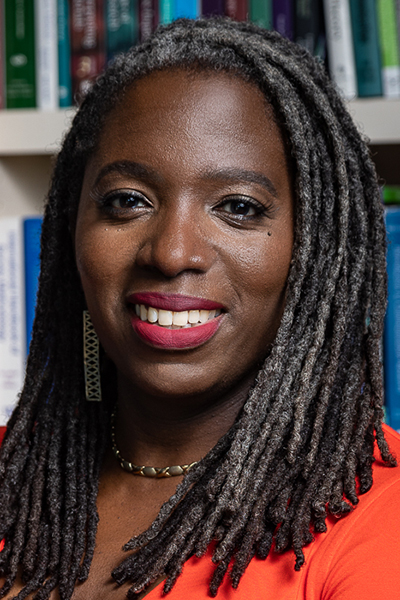When faced with a problem as deeply rooted and complex as racial disparities in health care, scientists’ inclination for perfect understanding can delay desperately needed progress.

“It feels like it’s Everest, on top of Everest, on top of Everest,” said CHEST Health Equity Task Force Chair and Hennepin Health Care Chief Health Equity Officer, Nneka Sederstrom, PhD, MPH, MA, FCCP. “People have a hard time knowing where to begin, so we get into this cycle of making sure that the problem exists, studying the depth of the problem, and who is actually affected—are there any subgroups within the subgroups?
“Enough with the studying,” she said. “We know there’s a problem, and even if you don’t have the level of the problem down to the exact atom, we need to start creating solutions and figuring out ways to address that problem. The more time you waste, the more people are hurt.”
That urgency will be reflected at the upcoming CHEST Annual Meeting in Boston, where CHEST members will present actionable strategies for combating racism in clinical practice. For the first time, those sessions will be collected and highlighted in a special Health Equity track, making it easy for CHEST 2024 attendees to learn the best ways to take care of patients of color in a health care environment that traditionally has not been set up for their benefit.
Pulmonary function tests are a prominent area where clinicians are actively working to undo longstanding misconceptions that have reinforced racial disparities. Emerging evidence in recent years has called into question the standard practice of race-based correction in spirometry, leading to new guidelines that encourage the use of race-neutral approaches. This significant change to one of the field’s most fundamental tests has left some unresolved questions in its wake, which experts will address during the session Impact of Race in Pulmonary Function Testing: Continuing the Conversation, on Wednesday, October 9, from 8 am to 9 am ET in Room 253B at the Boston Convention & Exhibition Center.

Aaron Baugh, MD, Assistant Professor at the University of California, San Francisco, School of Medicine, will chair that session, as well as the ticketed problem-based learning session Using Race-Neutral Interpretation to Achieve Race-Conscious Practice, Sunday, October 6, from 2:45 pm to 3:45 pm in Room 203. By synthesizing academic debate into take-home strategies and demonstrating the real-world benefits of health equity recommendations, Dr. Baugh hopes to cut through some of the outside noise that distracts clinicians from providing the best care for their patients.
“Terms pop up periodically—race-blind, antiracist—and they can be really hard for people to make sense of. In part because of political connotations or the translation from other academic disciplines, there are lots of opportunities for confusion or misunderstanding,” he said. “What’s important is to take this idea that has been coming up in the medical literature and try to tack down what that really means in terms of day-to-day clinical care. We aim to make it clear for everyone how this is achievable.”

The CHEST 2024 Health Equity track will also bring awareness to other less-discussed issues that may fly under the radar at clinics and hospitals. Former CHEST President, Steven Q. Simpson, MD, FCCP, Professor of Pulmonary, Critical Care, and Sleep Medicine at the University of Kansas and Chairman of the Board for the Sepsis Alliance, remembers being dismayed to discover that patients of color in his own emergency department were receiving slower treatment for sepsis than white patients. He will chair the panel discussion Sepsis Care That Is Antiracist, Sunday from 2:45 pm to 3:45 pm in Room 210C, which will unpack contributing factors and explore best practices to ensure equitable care for patients of color.
“No one’s accusing our doctors of being racist, certainly not willfully racist,” Dr. Simpson said. “White people are very defensive about that and will say, ‘I’m not racist, you know. I treat everyone the same.’ And in point of fact, treating everyone the same is not exactly the right way to go. You have to have empathy and compassion for people who are different from you.”
Dual Sentences: Health Disparities Affecting Incarcerated Patients in the Clinic and ICU, on Sunday from 4 pm to 5 pm in Room 256, is another Health Equity track session that will address an issue that may feel niche to some but, in reality, is incredibly impactful, Dr. Sederstrom said.
As a member of the CHEST 2024 Scientific Program Committee, she is excited to see expanded opportunities to showcase and celebrate this work at the annual meeting. The next step is for CHEST members to show up, engage in the conversations, and apply the lessons to their day-to-day practice.
“There’s this sense of, if I go to a health equity talk or a DEI talk, it’s somehow not relevant to me because I think that I don’t need it, or I think that I’m fine in my practice,” Dr. Sederstrom said. “My challenge is for people to choose to do something outside of their norm—pick one and try it out. Because the more we expand our knowledge base in this space, the more we see how relevant it is for taking care of our patients. And if we truly consider ourselves caregivers and clinicians, then we have to think of all the elements that make up the patients who we care for.”
Join us at CHEST 2025
Save the date for the next Annual Meeting, October 19 to 22, 2025, in Chicago. CHEST 2025 will explore the latest advancements in pulmonary, critical care, and sleep medicine, with a focus on innovation and the future, just as the city itself embodies progress and reinvention.





